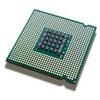We present YOLOBench, a benchmark comprised of 550+ YOLO-based object detection models on 4 different datasets and 4 different embedded hardware platforms (x86 CPU, ARM CPU, Nvidia GPU, NPU). We collect accuracy and latency numbers for a variety of YOLO-based one-stage detectors at different model scales by performing a fair, controlled comparison of these detectors with a fixed training environment (code and training hyperparameters). Pareto-optimality analysis of the collected data reveals that, if modern detection heads and training techniques are incorporated into the learning process, multiple architectures of the YOLO series achieve a good accuracy-latency trade-off, including older models like YOLOv3 and YOLOv4. We also evaluate training-free accuracy estimators used in neural architecture search on YOLOBench and demonstrate that, while most state-of-the-art zero-cost accuracy estimators are outperformed by a simple baseline like MAC count, some of them can be effectively used to predict Pareto-optimal detection models. We showcase that by using a zero-cost proxy to identify a YOLO architecture competitive against a state-of-the-art YOLOv8 model on a Raspberry Pi 4 CPU. The code and data are available at https://github.com/Deeplite/deeplite-torch-zoo
翻译:暂无翻译






